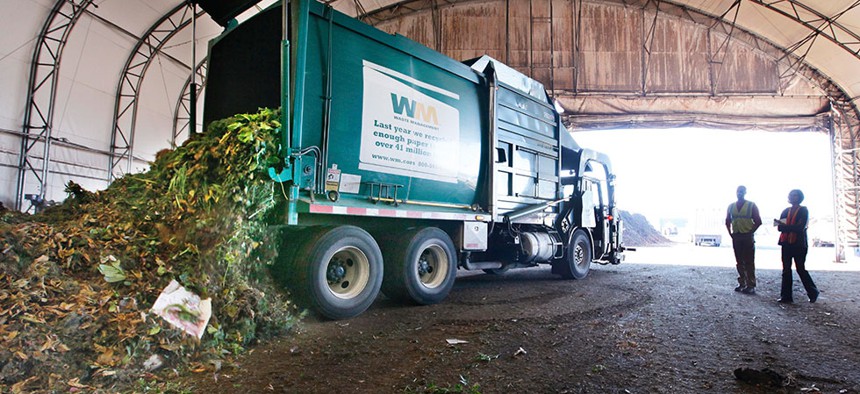Seattle's Scarlet Letter Composting System

s a truck dumps compost materials inside a receiving area at the Cedar Grove processing facility in Everett, Wash. in 2011. Elaine Thompson/AP file photo

Connecting state and local government leaders
The city is using public shame to get residents to recycle their food waste.
In a more perfect world, leftover food would find its way to the starving people in far-flung places that many parents scolded children about. Instead, as Roberto Ferdman at The Washington Post notes, "food waste has become a growing problem in cities across the United States—the country throws out more food than plastic, paper, metal, or glass."
One of the cities leading the charge in the effort to staunch food waste is Seattle, which passed a law last September that requires residents to compost leftover food. The law went into effect in January, but to educate Seattleites (which is,somehow, the demonym) the city is using a particularly aggressive method: shame.
If the city's waste-management contractors encounter a house, apartment, or commercial property with garbage containing more than 10 percent recyclables or food, they tag the garbage bins with a bright red sticker. "I'm sure neighbors are going to see these on their other neighbors' cans," one contractor told NPRearlier this week. "Right now, I'm tagging probably every fifth can."
"The stickers are like getting an 'F' on a school paper," one Seattle resident wrote in an email, adding that some craftier residents were simply using their garbage disposals more to skirt the law.
The sticker system is only temporary; in July, the city will begin fining households, landlords, and businesses for failing to sort food waste. Houses will be fined $1 per infraction, apartments and buildings paying $50. According to Seattle's Department of Public Utilities, "the food waste law will divert 38,000 tons of food scraps from the landfill via composting" as the city aims to recycle or compost 60 percent of its waste in 2015. Seattle's law is the first in the country to fine—and shame—residents for failing to sort their refuse.
The metropolitan area may have its biggest test this weekend as the underdog Seattle Seahawks square off against the New England Patriots in the Super Bowl. In addition to food waste, Seattle's new law requires that "compostable paper, including pizza boxes, paper napkins and paper towels," also be composted. Which in a way, might make the sorting easier. What doesn't get covered in buffalo sauce during the big game?
Seattle garbage collectors are warning residents about the new compost law. Seeing more violators than they expected. pic.twitter.com/oGvAoqOqnx
— Jeff Dubois (@JeffKIRO7) January 2, 2015NEXT STORY: Colorado to demo LTE safety network




